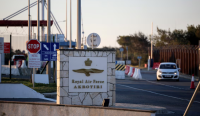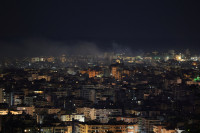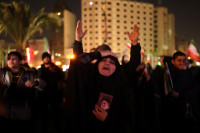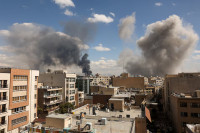World
North Korea exploding inter-Korean roads ‘symbolic move’: JCS
Tuesday’s move is a “dramatic visualization” of the previously announced closures of the roads paved by South Korea in a previous time of inter-Korean exchanges and cooperation, a JCS official said.
The Korea Herald
North Korea blew up roads near the border on each side of the Korean Peninsula on Tuesday, in another demonstration of cutting ties with the South.
Exploding the inter-Korean roads north of the border on the east and west coats, which had already been dismantled by North Korea, is thought to be a “largely symbolic move,” an official from South Korea’s Joint Chiefs of Staff told reporters in a closed-door briefing.
Tuesday’s move is a “dramatic visualization” of the previously announced closures of the roads paved by South Korea in a previous time of inter-Korean exchanges and cooperation, the JCS official said.
“This seems to be North Korea’s way of saying they refuse exchanges,” he said.
The JCS official said the explosion was not intense and that the damage caused was only at surface level, with some personnel appearing to photograph the act as it happened behind a screen from not too far off.
“You could see North Korean workers scraping off the surface of the roads afterwards, and the extent of destruction was not as massive as you would expect,” he said.
From late last year, North Korea had already begun laying landmines and putting up barriers around the roads and railways leading to the South, effectively blocking any travel.
In addition to the dramatic effect, North Korea was attempting to signal to the United Nations Command to play a mediator role in recent escalations with the South around the Demilitarized Zone, the JCS official said.
Last week, North Korea made a rare move of notifying the UN Command about its plans for “fortifying” the areas north of the military demarcation line dividing the Korean Peninsula.
“North Korea appears to be trying to achieve various effects, such as signaling to the US or the UN Command to mediate the ongoing events with South Korea,” the JCS official said.
The official added the South Korean JCS “expects” the UN Command, which oversees the Demilitarized Zone between North and South Koreas, to “make a statement” on potential violations of the Korean War armistice agreement by the North.
“We see the border activities by North Korea to be Korean War armistice violations,” he said.
In response to the explosion Tuesday, the South Korean military fired warning shots at the ground south of the demarcation line to deter further threatening moves from the North after playing broadcasts of warning messages several times, according to the JCS.
In a message to reporters Tuesday, the JCS said responsibility for the current situation “lies fully with North Korea, which has carried out dangerous explosions close to our side.” The situation with North Korea was “under control and being managed,” it added.
Reiterating the message by the JCS, Seoul’s Ministry of Unification in charge of inter-Korean affairs said in a statement that North Korea blasting parts of the roads on both sides of the Korean Peninsula was “an extremely abnormal measure.”
The ministry said North Korea was once again pulling a “once-sided act” as it did four years ago when it blasted the inter-Korean joint liaison office four years ago.
The roads destroyed by North Korea cost the South some $132 million to construct following the summit between former South Korean President Kim Dae-jung and Kim Jong-un’s father and then-North Korean leader Kim Jong-il.
“North Korea is entirely responsible for the destruction of inter-Korean roads and railways,” the ministry added.
-In association with the Asia News Network




 9.6°C Kathmandu
9.6°C Kathmandu















